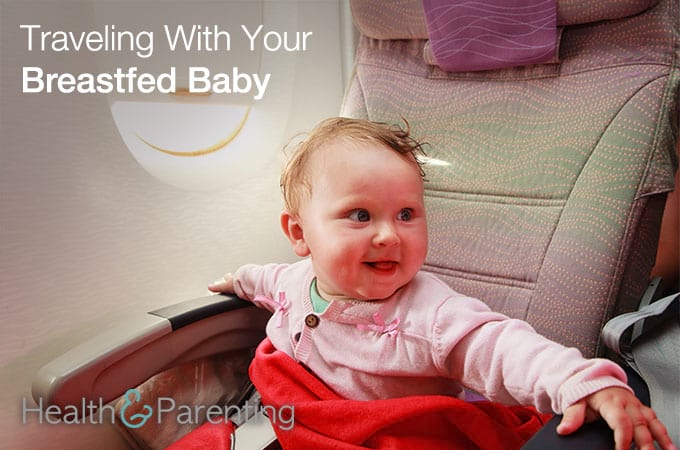One of the great things about breastfeeding is that you typically don’t need lots of stuff in order to do it. Your baby and your own body – that’s all you really need. No bottles, formula, looking for water, mixing, warming, cleaning. Breastmilk is sterile, always ready and at just the right temperature. This makes breastfed babies very portable, and makes traveling with one pretty simple (at least the feeding part).
No matter how you’re traveling, be sure to wear comfortable clothes. Two-piece outfits – so you can easily lift your top to nurse – are essential. You might even want to invest in a couple of nursing tops to help you feel comfortable. A cardigan or other layering, like a scarf, can give you some added privacy if you’re shy about nursing in public.
If you’re flying:
- Pack extra clothes and diapers in your carryon just in case your luggage is delayed (this is true whether your baby is breastfed or not!)
- Pack extra water for yourself – airplanes can be pretty dry and you don’t want to get dehydrated.
- Nursing your baby as your plane is taking off and as it’s landing can help relieve some of the discomfort your baby may feel with the pressure change.
- Carrying baby in a sling or wrap is helpful in crowded airports (though you’ll need a car seat for on the plane).
- Window seats may give a little more privacy and bulkhead seats offer more legroom – so you may want to consider that when booking your flight.
- You may want to talk to the flight attendants as you’re boarding – just to let them know you plan of feeding your baby in flight – and check the airline’s policies ahead of your trip.
If you’re traveling by car:
- Plan for plenty of stops to feed and change baby.
- Find a place to safely stop before removing him from his car seat. As much as you may want to try maneuvering yourself to nurse him while your partner continues driving, it’s essential to take the extra time to stop.
- You might consider planning long stretches of driving during the night or during baby’s regular nap times.
- The motion of the car may lull baby to sleep – if your baby is very young, you may need to stop to wake baby to nurse.
It’s not unusual for baby’s schedule to change when traveling. All the excitement, overstimulation, and schedule disruption may take some adaptation on your part. Don’t forget babies get jet lagged, too. Allow extra time for adjustments.
Pay attention to your own hunger and thirst cues, as well as your need for rest. Allow plenty of time to get from one place to another – traveling with children always takes more time than you think it will.
Written by Michelle, childbirth instructor, lactation consultant, and mother to 4 busy kids
This information is not intended to replace the advice of a trained medical doctor. Health & Parenting Ltd disclaims any liability for the decisions you make based on this information, which is provided to you on a general information basis only and not as a substitute for personalized medical advice. All contents copyright © Health & Parenting Ltd 2016. All rights reserved.










